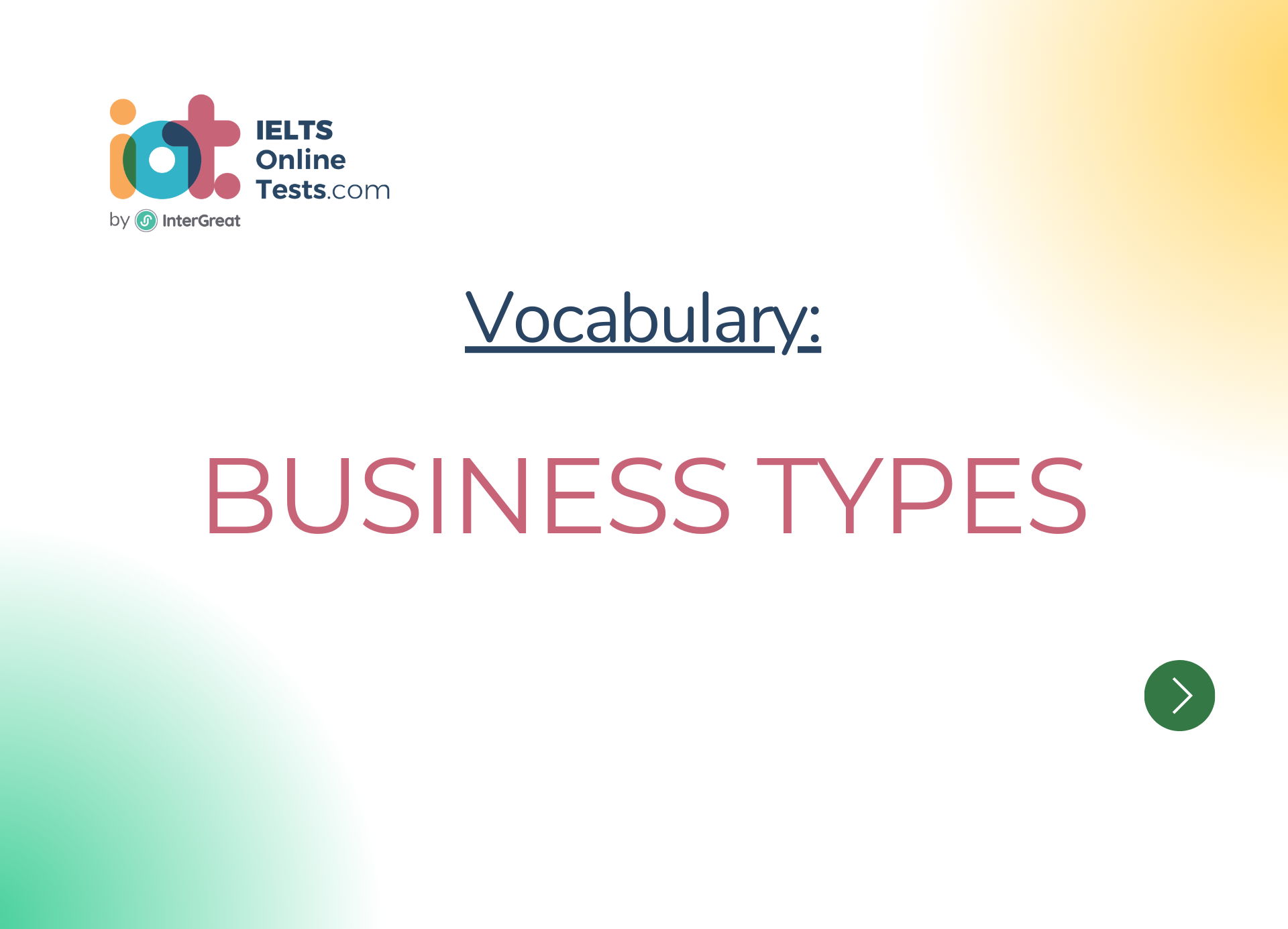
Business types
Here are some vocabulary words related to business types for IELTS band scores 4.5-6.0:
Sole Proprietorship:
A business owned and operated by a single individual. The owner is personally liable for the business's debts.
Partnership:
A business structure where two or more individuals share ownership and responsibilities. Partners have shared liability for the business.
Limited Liability Partnership (LLP):
A partnership where each partner has limited liability for the debts of the business.
Corporation:
A legal entity separate from its owners. Shareholders have limited liability for the company's debts.
Limited Liability Company (LLC):
A hybrid business structure that combines features of both a corporation and a partnership, providing limited liability for owners.
Cooperative (Co-op):
An organization owned and operated by its members, who share benefits and responsibilities.
Franchise:
A business model where a company grants rights to others to sell its products or services under its brand name.
Small and Medium-sized Enterprises (SMEs):
Companies that fall within a certain size range, often with specific government support and regulations.
Start-up:
A newly established business with a novel product, service, or technology, often in a fast-growing industry.
Family Business:
A company that is owned and operated by members of the same family.
Non-profit Organization:
An organization that operates for a specific social, cultural, educational, or charitable purpose, rather than to generate profit.
Public Sector:
The part of the economy controlled or owned by the government, including government agencies and organizations.
Private Sector:
The part of the economy controlled and owned by private individuals or companies.
Joint Venture:
A business arrangement where two or more parties collaborate on a specific project or business activity.
Multinational Corporation (MNC):
A company that operates in multiple countries and has a global presence.
State-Owned Enterprise (SOE):
A company that is wholly or partially owned and operated by the government.
Entrepreneurship:
The activity of starting and managing a new business venture.
Retail Business:
A business that sells products directly to consumers.
Wholesale Business:
A business that sells goods to retailers, other businesses, or institutions.
Manufacturing Business:
A business that produces goods through the use of machinery, labor, and raw materials.
Service Business:
A business that provides intangible services to customers, such as consulting, healthcare, or education.
E-commerce:
The buying and selling of goods and services over the internet.
Brick-and-Mortar:
Traditional physical stores as opposed to online businesses.
Supply Chain:
The sequence of processes involved in producing and distributing a product, from raw materials to the final consumer.
Outsourcing:
The practice of contracting out certain business functions or operations to external providers.
Offshoring:
The relocation of business processes or services to another country.
Freelancing:
Working independently and offering services to multiple clients on a project-by-project basis.
Corporate Social Responsibility (CSR):
A company's commitment to ethical and social responsibilities, including environmental sustainability and community engagement.
Business Plan:
A detailed document outlining a company's goals, strategies, and financial forecasts.
Market Research:
The process of gathering information about customers, competitors, and market trends to make informed business decisions.
Profit Margin:
The difference between the cost of producing a product and its selling price.
Revenue:
The total income generated by a business through sales and other activities.
Assets:
Items of value owned by a business, including cash, equipment, and property.
Liabilities:
Debts or financial obligations owed by a business.
Profitability:
The ability of a business to generate profit.
Gross Domestic Product (GDP):
The total value of all goods and services produced within a country's borders in a specific time period.
Consumer Goods:
Products purchased by individuals for personal use.
Business-to-Business (B2B):
A business model where companies sell products or services to other businesses.
Business-to-Consumer (B2C):
A business model where companies sell products or services directly to consumers.
Market Share:
The portion of a market controlled by a specific company or product.
Corporate Culture:
The values, beliefs, and practices that shape the identity and behavior of a company and its employees.
Innovation:
The process of introducing new ideas, products, or methods that lead to improvements or developments.
Entrepreneur:
An individual who starts and operates a new business venture, taking on financial risks for potential profits.
Venture Capital:
Investment capital provided to start-ups and small businesses with high growth potential.
Bankruptcy:
A legal process where a company declares its inability to repay debts and seeks protection from creditors.
Intellectual Property:
Intangible assets, such as patents, trademarks, and copyrights, that are protected by law.
Mergers and Acquisitions (M&A):
The consolidation of two or more companies through various financial transactions.
Divestment:
The process of selling off assets, subsidiaries, or business units.
Corporate Merger:
The combination of two or more companies to form a new entity.
Business Strategy:
A plan of action designed to achieve specific business objectives and goals.
It's important to understand these business-related terms and their contexts to improve your English language skills for the IELTS exam. Practice using them in sentences and conversations to become more confident in your vocabulary. Good luck with your studies!




